
The Vietnam Reform Revolutionary Party or the Việt Tân is an organisation that aims to establish liberal democracy and reform Vietnam through peaceful and political means.

Dr. Nguyen Quoc Quan is a Vietnamese-born American mathematics researcher and human rights activist and a member of the leadership committee of the anti-communist organization Viet Tan. He was detained on April 17, 2012, after arriving at Tan Son Nhat airport in Ho Chi Minh City, Vietnam. On April 28, 2012, Vietnam's state media reported the "pro-democracy activist" has been arrested and accused of organizing "terrorism" activities. Previously, Dr Quan was arrested in Ho Chi Minh City in Vietnam on a trip on November 17, 2007, for preparing pro-democracy flyers. During that first trip, he brought in a Vietnamese translation of the book From Dictatorship to Democracy about nonviolent resistance. He stood trial in Vietnam on May 13, 2008, on charges of "terrorism" and was sentenced to 6 months in prison. He was eventually released on May 17, 2008, and returned to his home in Elk Grove, California, to his wife and two teenage sons. In 2012, he was re-arrested on another trip to Vietnam, and held in prison for 9 months. Following intense US pressure, he was deported on January 30, 2013.
Lê Công Định is a Vietnamese lawyer who sat on the defence of many high-profile human rights cases in Vietnam. He was critical of bauxite mining in the central highlands of Vietnam, and was arrested by the Vietnamese government on 13 June 2009 on charges of "national security", though the arrest was met with strong objections from the international community. Lê Công Định is one of Amnesty International's prisoners of conscience.
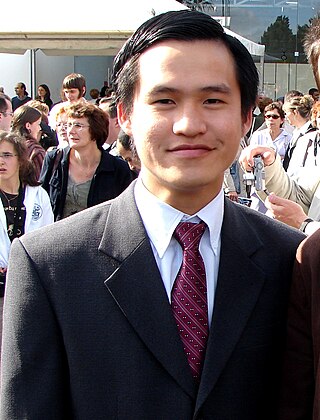
Nguyễn Tiến Trung is a pro-democracy activist in Vietnam. As the founder and leader of the Assembly of Vietnamese Youth for Democracy Trung has been one of the outspoken political dissidents in Vietnam. He was arrested on July 7, 2009, by the public security of Vietnam for allegedly "plotting to overthrow the government of Vietnam." The accusation was persistently rejected domestically and internationally by some Vietnam analysts such as Pham Hong Son and Carl Thayer.
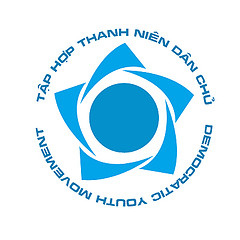
Assembly of Vietnamese Youth for Democracy or Democratic Youth Movement is an organization of young Vietnamese worldwide intent on pushing for political freedom in Vietnam. The movement was founded by Nguyễn Tiến Trung a student dissident recently arrested by the authorities in Vietnam July 7, 2009 and charged with "plotting to overthrow the regime".
Phạm Minh Hoàng is a French-Vietnamese blogger and lecturer in applied mathematics at the Ho Chi Minh City University of Technology, who was arrested in Vietnam for his political writing and activism on August 13, 2010. Phạm Minh Hoàng, who writes with the pen name Phan Kien Quoc, was convicted on August 10, 2011 for writing “33 articles that distort the policies and guidelines of the Party and the State.” He was sentenced to three years in jail and three years of probation under Article 79, “subversion of administration”—one of many penal codes defined vaguely and used to detain and arrest political activists but served only 17 months and spend another three years under house arrest. Phạm Minh Hoàng was based in Ho Chi Minh City, Vietnam where he used to lecture at the university and offered free classes for Vietnamese youth on leadership skills. In June 2017, he published a call for help on his Facebook page upon receiving the news that he is likely to lose his Vietnamese citizenship and be deported to France. Hoang was detained by local authorities on June 23 before being forcibly exiled to France the following day.
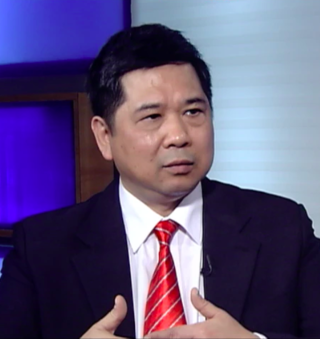
Cù Huy Hà Vũ is a Vietnamese legal scholar. A government critic and a dissident, he was taken into custody in 2010 on charges of "propaganda against the state" and "plotting to overthrow the communist government of Vietnam". On 4 April 2011, Vũ was sentenced to 7 years in prison for "spreading anti-state propaganda", drawing protests from human rights groups, the Roman Catholic Church, and the international community.
Nguyễn Văn Hải, better known by his pen name Điếu Cày, is a Vietnamese blogger who has been prosecuted by the government of Vietnam for tax evasion and "disseminating anti-state information and materials". His imprisonment was protested by several international human rights organizations, and Amnesty International considers him a prisoner of conscience. On 21 October 2014, he was released and deported to the United States.
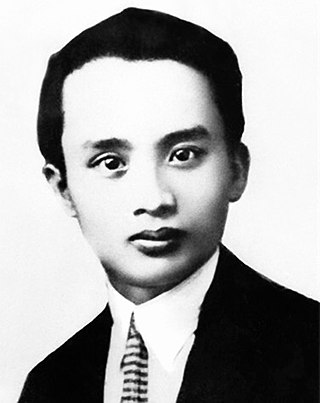
Hà Huy Tập was a Vietnamese revolutionary and the third General Secretary of the Central Committee of the Communist Party of Vietnam (CPV).
Between July 2011 and December 2011 a number of young Vietnamese Christian activists, primarily located in northern province of Nghệ An, Vietnam, and working with the Congregation of the Most Holy Redeemer, were arrested by the Vietnamese government for protesting for land rights and circulating a petition to free prominent legal rights activist Cu Huy Ha Vu, a prominent human rights defender who was imprisoned for seven years in April 2011.

The 11th Central Committee of the Communist Party of Vietnam was elected at the 11th National Congress of the Communist Party of Vietnam. The 11th Central Committee elected the 11th Politburo and the 11th Secretariat.
On January 8–9, 2013 a trial was held by the People's Court of Nghệ An Province, Vietnam for 14 democracy activists, primarily belonging to the Catholic church, including high-profile blogger Paulus Le Son. All of them were sentenced to 3–13 years in prison on charges of subversion. Many human rights organizations have called this the "largest case of its kind" in Vietnam, and condemned the sentence. Many organizations, including the US Embassy in Vietnam, have called for an immediate release of the dissidents.
Trần Huỳnh Duy Thức is a Vietnamese engineer, entrepreneur and human rights activist. He was the founder and president of EIS, an international internet and telephone line provider. He is one of Amnesty International's prisoners of conscience.
The following lists events that happened during 2014 in Vietnam.

Ngo Minh Hieu is a Vietnamese cyber security specialist and a former hacker and identity thief. He was convicted in the United States of stealing millions of people's personally identifiable information and in 2015 he was sentenced to 13 years in U.S. federal prison. After his early release from prison in 2020, Hieu returned to Vietnam and was recruited by the National Cyber Security Centre (NCSC) under the Ministry of Information and Communications as a technical expert. Currently, he holds the positions of director of the limited liability ChongLuaDao Social Enterprise Limited Liability Company and manager of the non-profit project ChongLuaDao, which he co-founded with his partners at the end of 2020.
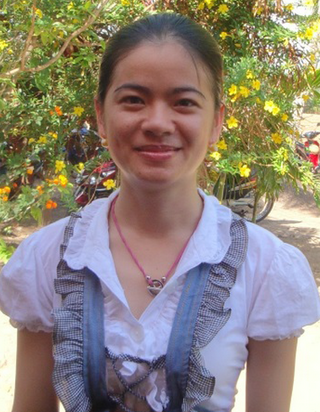
Nguyễn Đặng Minh Mẫn is a human rights activist. Seeing the social inequities in Vietnam, she became a freelance photojournalist and posted photographs online as an alternative news source to state-controlled media.
Nguyễn Văn Oai is a social rights activists from Quynh Luu district, Nghe An province. He is a Protestant, and studied citizen journalism under Vietnam Redemptorist News. Oai was arrested on August 2, 2011, in Ho Chi Minh City, charged under clause 2 of article 79, and sentenced to three years’ imprisonment plus four years of controlled residence.
Censorship in Vietnam is pervasive and is implemented by the Communist Party of Vietnam (CPV) in relation to all kinds of media – the press, literature, works of art, music, television and the Internet. The government censors content for mainly political reasons, such as curtailing political opposition, and censoring events unfavorable to the party. In its 2021 Press Freedom Index, the Reporters Without Borders (RSF) ranked Vietnam as "very serious" at 174 out of 180 countries, one of the lowest in the world and the worst ranking on their five-point scale. Similarly, Freedom House's 2021 Freedom on the Net report classifies Vietnam as "not free" in relation to the Internet, with significant obstacles to access, limits on content and significant violations of user rights.

The 10th Central Committee of the Communist Party of Vietnam was elected at the 10th National Congress of the Communist Party of Vietnam. The 10th Central Committee elected the 10th Politburo and the 10th Secretariat.
Ho Van Hai is a Vietnamese doctor and blogger. He was arrested and charged with "anti-state propaganda” under Article 88 of the Vietnamese Penal Code. After a one-day trial in Ho Chi Minh City, Hai was sentenced to four years in prison followed by two years' house arrest.










